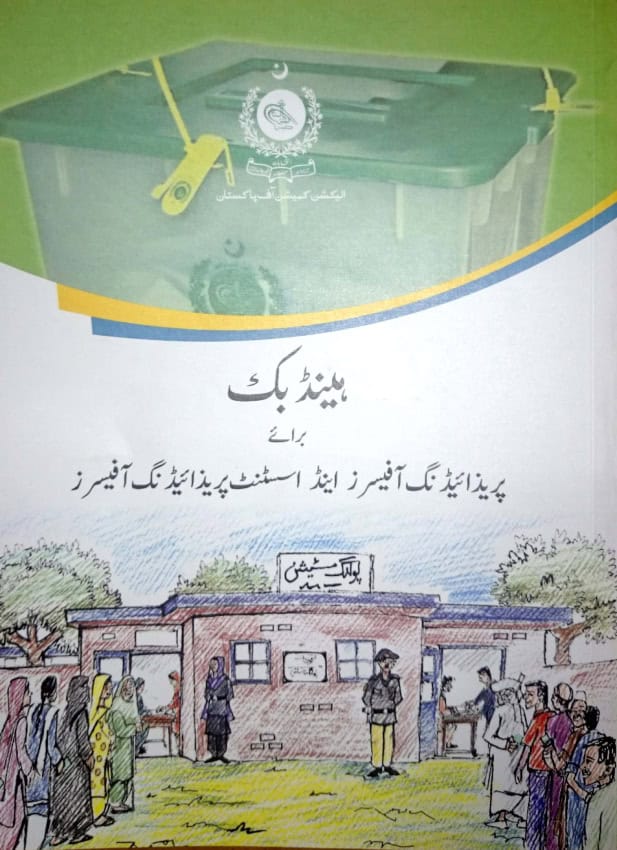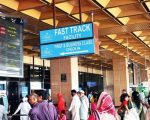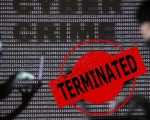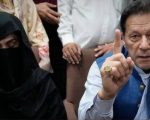In the middle of an unnamed bazaar in Ghaziabad, a five minute drive away from the bustling market at Butt Chowk in Tajpura, lies the graveyard of Takia Mundran Wala, surrounded by streets so narrow that two people cannot walk through them abreast. I took out the election order I had received from the Sessions Court a few days earlier – the yellow sheet of paper informing me that I was required to serve as a Senior Assistant Presiding Officer (SAPO) at a polling station for NA-129 (Lahore) – and read off the address of the school I was to report to: “Safdar Foundation High School, formerly Arfat Model High School, Takia Mundran Wala”. I looked around, wondering if I was in the right place. Google Maps had guided me to this graveyard, but it could not help me in locating the school. It simply didn’t exist, as far as Google Maps was concerned. I could not see any signboards indicating where the school, or any school for that matter, might be. What I did see was a general store set up in a house which adjoined the graveyard. Crossing my fingers, I asked the shopkeeper for help, who informed me that the school was on the other side of the graveyard. Two minutes later I found myself in another lane so narrow and blocked from sunlight that it appeared to be dark, even though it was the middle of the afternoon.
One wall of this lane had “Safdar Foundation High School” painted on it, but the building seemed to be just a collection of adjacent homes. As I was wondering which door led into the school, a little boy with a schoolbook in his hand ran into one of the wide open doors. Thinking that I had found my destination, I strode in, only to find a shirtless man sprawled out on a charpoy watching TV. Red with embarrassment, I ran out as an unseen woman yelled at him to “shut the damn door!” A moment later the same boy I had just seen followed me out, took my hand, and offered to lead me to the school, which turned out to be next door.
The Night Before
The door was locked, forcing me to knock. A young soldier answered and gruffly asked me my business. When he had seen the election order and checked my CNIC to confirm that I was who I claimed to be, his manner softened somewhat and he let me in. It was 3.30 pm on the 24th of July, and I was to wait here with the other APOs until the Presiding Officer (PO) arrived from the Sessions Court with the materials to be used in the next day’s election. When she finally arrived three hours later, it was in a van accompanied by soldiers to ensure not only her security but also that of the ballot papers and other important paraphernalia that she carried. (Only later did I learn that had I met the PO at the easily found Sessions Court, I too would have arrived in the same van, thus sparing me the necessity of wandering into people’s homes.) The soldier repeated the instructions that had been given to us by the Election Commission of Pakistan in the two-day training session we had attended a week earlier. “Set up the voting screens (the kiosks where voters would be stamping their ballots) in a corner where no one can see what they’re doing. Count the stationery, envelopes, and forms you have been given, but do not touch the ballot papers.” The soldier also insisted that the ballot papers be stashed in a room that could be padlocked, requiring us to haul sacks of papers into the only room with a door. This came as a relief; some days earlier a court official had mentioned the undesirable possibility of us officers having to stay the night to guard the ballots.
The Morning of the Polls
It was only at 7 the next morning – just an hour before the polls were due to open – that we were allowed to tally the ballot papers with the packing invoice (the list prepared by the ECP of the items that had been entrusted to us). The polling agents arrived in due course, one representing PML-N and the other PTI. At their request, we riffled through random ballot books to indicate to them that none of the ballot papers had been stamped beforehand. We then showed them that the ballot boxes were empty, and obtained their signatures on Form 42 (“Statement Regarding Inspection of Ballot Boxes Before Start of Poll”). The agents watched as we sealed the lids of each ballot box with four official ECP seals, and then they noted down the numbers of each seal. Finally, they recorded the numbers of the ballot books issued to each of the APOs, and the serial numbers of the ballot papers contained in each.
The Ground Rules
During our training sessions, we were continually reminded of the ECP’s commitment to conduct “free, fair, and neutral” elections, reflected in the words of their logo: “Azaadana, Munsifana, Ghair Janibdarana”. We were told that we were not to stop any authorized polling agents, journalists, or independent observers from dropping in and keeping an eye on the proceedings. Nor were we supposed to give even a hint of prejudice in the way we conducted ourselves. In this regard the ECP rules were strict: do not accept food, money, or gifts from election candidates or voters; do not tell the voters who they should or should not vote for; do not stamp ballot papers for them; do not indicate your own voting preferences in any way, either through clothing and accessories or through words and actions; do not accept food or water from polling agents; do not share your food or water with them either. This last decree forced the polling agents to stop drinking water from a water cooler when they realised that it had been provided by the PO and not the school.
New Features in the 2018 Elections
A new feature at this election was the “Summary Trial” process, which temporarily imbues the PO with the powers of a first grade magistrate, allowing him or her to call in security officials when needed, and even fine and/or sentence any offending persons for disrupting the proceedings. I could not help but contrast this development with the 2013 elections, when my family and I were forced to wait outside a polling station in Karachi until 2.30 pm, temporarily closed because one of the candidates had stolen the ballot boxes. None of that seemed possible this time around.
Another welcome addition was the ability to include “tendered votes” in the count. A common complaint in previous elections was that voters would enter their polling stations only to find that their names had been crossed from the voters’ list. When they showed their unstained thumb to demonstrate that they had not yet voted, they would be given ballot papers – but these votes would then be set aside in a separate envelope and not be included in the counting process, thus allowing for manipulation of the results. But this time the ballot papers of such voters would be counted. This change in procedure, along with better security and more stringent checking, meant that there was not a single tendered vote at my polling station.
Issues Faced
Failure of the RTS app
It was only when the day was over that the situation turned rather unpleasant. The most annoying development was that the Result Transmission System (RTS) mobile application developed by the National Database and Registration Authority (NADRA) failed to function at the moment of truth. We were introduced to a dummy version of this app during our training session, and taught how to log in, take pictures of the all-important Form 45 (“The Result of the Count”), enter the candidates’ vote counts in the respective fields, and upload the data to the ECP. NADRA officials had crowed about how their app was the first of its kind anywhere in the world, and when one of the trainees brought up the possibility of the application crashing on the big day, the NADRA official conducting our training brushed the concerns aside. “This cannot happen,” he boasted. “We have designed the app to take the load.”
But on the evening of the 25th, the RTS app failed miserably. When the PO tried to transmit results through the app, it refused to proceed beyond the login screen. No matter how many times she tried, she kept getting the notification “The application has stopped.” I saw her repeating the steps we were taught during the training session, but to no avail. And since the app had been set to work only on her mobile, no one could upload the data from a different phone. Frustrated, she finally called a senior court official (the Returning Officer) for help; he instructed her to abandon the effort and bring the results to the Sessions Court. By now it was 11 pm, five hours after the polls had closed, and three hours after we had compiled the results.
Shortage of Form 45s
Another issue that marred the proceedings was the shortage of Form 45s, a problem which has led to allegations of rigging. ECP rules require copies of the results to be distributed to numerous recipients. For example, a copy of the results has to be given to a polling agent from each of the candidates present. Further copies have to be distributed to the RO, the Election Commissioner, and so on. With only two polling agents present, it seemed that we would be able to satisfy the official requirements – until a sharp-eyed polling agent noticed an error on the results form. Since we had no extra copies of the form on which to start afresh, the PO crossed out the incorrect figures, jotted down the correct ones, and initialed it. This led to a protest on the part of the polling agents, who demanded an unadulterated form, a situation that was only resolved by a member of the armed forces stepping in and somewhat forcefully convincing them to accept the form that they had been given. Had there been more than two polling agents, or outside observers present to whom copies of the form are also supposed to be given, we would have been unable to provide everyone with their own official copies of the results; this would undoubtedly have led to allegations of rigging. I have heard of at least one polling station where vote results were distributed not on Form 45s, but on everyday sheets of paper- a clear violation of ECP rules.
The Role of the Army
What stood out through all of this, though, was the role of the army in ensuring a free and fair election process. The soldiers insisted on supervising the counting and checking the forms we filled out. This included an inspection of not only the aforementioned Form 45, but also the results on Form 43 (“Tendered Votes Count”), Form 44 (“Challenged Votes Count”), and the various envelopes containing individual candidate ballots. The final inspection was of Form 46, “Count of the Ballot”, where they checked that the number of the ballot papers issued to us equaled the total of the used and unused ballots, and that the number of used ballot papers matched the number of votes cast. The army would not have allowed us to leave if there had been any unaccounted for discrepancies. The army also facilitated the safe transportation of myself, the PO, the ballot papers, and all other materials to the Sessions Court.
Room for Improvement
Better management of the election orders
There were several things that could have been done better, starting from the receipt of the election order itself. The first time I heard about my summons was through a colleague of mine who had received a call from the Sessions Court on the office landline, asking her to pass on instructions to me to collect my order from the Sessions Court. It turned out that the officers of the court had chosen to make calls on 13th July, a day when mobile networks were blocked across Lahore due to Nawaz Sharif’s arrival from England. It was to the credit of the court officers, though, that they were willing to patiently answer any and all questions I had regarding the subsequent steps in the process without any signs of irritation, a pleasant change from my interactions with government officials in the past.
There was also the problem of duplicate orders being issued to some individuals, perhaps due to the lack of a computerized system to manage it all. Two days after I received my initial election order, I received another call asking me to appear at the Sessions Court. When I explained that I had already received my election order, the official who called me sounded thoroughly perplexed, and asked me to come in anyway to resolve the confusion. While this second visit to the Sessions Court was brief, it was an inconvenience that should have been avoided.
Reducing miscommunication during the training sessions
The two-day long training sessions were also problematic. While the training was professional, and the booklet they provided to us comprehensive, the venue where it took place was uncomfortable. As with the issuing of election orders, the training process was fraught with miscommunication. One of my colleagues had not even been informed about the training sessions, yet was somehow expected to show up for them. When she learned about them, she called the Sessions Court, who instructed her to go to the session immediately. But when she arrived the trainer refused to let her attend, citing her lateness. It took her a series of phone calls to the Sessions Court before she could get herself a seat in the next training session.
Fixing the RTS app
The training sessions revealed some of the drawbacks of the RTS application, which were to haunt us later. On the first day of training, we were told to bring smartphones the next day, when NADRA officials would be present to introduce us to the system. What was not communicated to us, however, was the fact that the RTS and the dummy app were only designed to work on Android version 5 and above. So when the NADRA officials arrived on day two, and asked us to download the dummy app titled “ECP RTS Training” from Google Play Store, more than half of the participants were unable to do so. Most people had an older version of the Android operating system installed on their phones. Others were not tech-savvy enough to even download and install software by themselves. The only solution that the NADRA officials could offer was “borrow a newer device from someone at home,” without considering whether or not such a device would be available. NADRA did undertake a survey in order to determine how many participants did not have the required Android version, but this was too little too late.
I later discovered that NADRA had been informed in advance about the possibility of the RTS crashing on election day. A report in Express Tribune describes how an unspecified number of returning officers from Faisalabad, Okara, and other cities in Punjab registered official complaints with NADRA regarding the app’s failure to register more than 50 presiding officers. They also complained that the app did not reflect the correct polling stations and candidates within certain constituencies, which would prevent correct data from being entered, thus defeating the purpose of the app. The report concluded by mentioning that NADRA officials “hoped” that the application would not fail on the day of the polls.
Selection of better polling stations
The ECP could also have improved the facilities at various polling stations. While I understand the need to establish a polling station at a location that is convenient to the voters, care should be taken to ensure that basic arrangements are in place for the polling staff and the voters. Safdar Foundation High School, for example, was a dingy school established in what appeared to be someone’s residence. Due to the fact that there were only three rooms on the ground floor, only the ladies’ polling booths could be set up there. As a result, the gents were forced to take the first floor, access to which was through a narrow staircase that many senior citizens found extremely difficult to navigate, requiring the soldiers and other voters to help them. The central hall lacked a roof, with the result that the torrential rains on 24th and 25th July caused flooding inside the premises as well as in the lane in which the school was located. Due to the absence of windows, there was no source of natural light into the school, and had there been a power failure, it would have been impossible to see anything. Despite promises by the school management that chairs and tables would be provided to us, they had locked up most of their furniture, leaving us with no choice but to use the benches that they had left behind- benches clearly designed for small children. As a result, after more than 15 hours of sitting, many of the polling staff, myself included, ended up with severe bruising and stiffness, following which I found myself unable to sit properly for the next two days. All these problems were in violation of ECP guidelines which stated that polling stations should be protected from the elements of weather, allow ease of access for the disabled and elderly, and have comfortable furniture.
Reducing language barriers
Perhaps the ECP could also have worked on resolving the language barriers. While the training materials were in Urdu, the trainers would often switch to Punjabi, requiring me to repeatedly request them to revert to Urdu. My failure to understand Punjabi also resulted in several communication problems on election day itself, since some of the voters spoke only Punjabi. Fortunately, the other APOs were kind enough to act as translators when required. This may be resolved by surveying election staff regarding the languages they speak and assigning them polling stations accordingly.
Concluding Thoughts
Despite these problems, my polling station was relatively well-run, but this seemed to not be the case across the country. A friend of mine at a polling station in Sindh informed me that the soldiers who were supposed to be in constant attendance disappeared for some time, which they were not supposed to do. Similarly, news reports regarding empty ballot boxes and ballot papers stamped to favour PTI’s opponents retrieved in garbage dumps in Karachi and Sialkot have fuelled suspicion that that the elections have not been as transparent as they are being touted to be. If Pakistani elections are going to be held without rancor or controversy, the ECP should ensure that all polling stations throughout the country strictly adhere to their rules.
When I first received my election order, I was looking forward to the whole affair. And despite the fact that election day left me bruised and battered, the experience taught me a lot, and I felt that I had made a contribution to the democratic process. Unfortunately, many of my colleagues felt differently, with some complaining about the long hours and others dissatisfied with the monetary compensation (Rs.4500 for APOs). I could detect no sense of civic duty, merely a resignation that to violate the court order could result in two years imprisonment. But their mood improved somewhat after the polls had closed and a cheerful PML-N polling agent distributed sweets to everyone. Little did he know.














